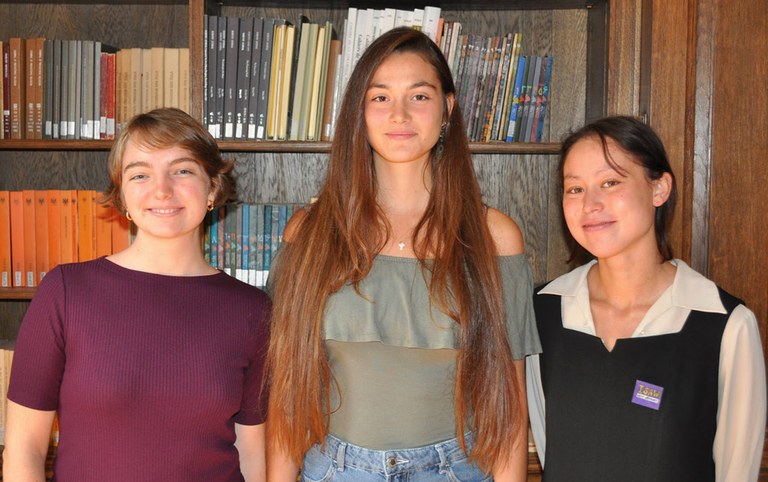Incoming Doctoral Students (Fall 2019)
This article by Marc LeBlanc first appeared in ISAW Newsletter 25 (Fall 2019).
 Incoming ISAW Doctoral Students, (L to R): Priya Barchi, Christina Stefanou, and Emily Everest-Phillips. Photo by Iris Fernandez.
Priya Barchi received her BA in Anthropology, with a concentration in Archaeology, and in Asian & Middle Eastern Studies from Barnard College of Columbia University in 2019. While there, she pursued the study of Sanskrit, South Asian ancient and contemporary history, and enriched her background in Classical studies by focusing on the Hellenistic East. Her thesis investigated the notion of Greco-Indian identity in Bactria and the Northern Indian Subcontinent during the Kushan period.
Incoming ISAW Doctoral Students, (L to R): Priya Barchi, Christina Stefanou, and Emily Everest-Phillips. Photo by Iris Fernandez.
Priya Barchi received her BA in Anthropology, with a concentration in Archaeology, and in Asian & Middle Eastern Studies from Barnard College of Columbia University in 2019. While there, she pursued the study of Sanskrit, South Asian ancient and contemporary history, and enriched her background in Classical studies by focusing on the Hellenistic East. Her thesis investigated the notion of Greco-Indian identity in Bactria and the Northern Indian Subcontinent during the Kushan period.
Priya has participated in several archaeological field projects: at Hadrian’s Villa in Italy, in Bolivia, and in the Himalayas. Meanwhile, she has also pursued her passion in museum education, working at the Rubin Museum of Art and the Institute for Classical Architecture and Art in New York. Through such research, museum experience, and the study of anthropological and post-colonial theory, she has developed a keen interest in the political implications of constructing narratives of the past and in the ways that heritage is presented and shared within communities.
While at ISAW, Priya is committed to researching the artistic and linguistic intersections between the Greco-Roman world and South Asia. She is excited to explore new theoretical frameworks for investigating trade, identity, cultural hybridity, and imperial power in the ancient world. At ISAW she hopes to also further pursue her passion in curatorial work and museum education.
Emily Everest-Phillips received a BA in History from the University of Oxford in 2017, and completed an MSt in Late Antique and Byzantine Studies in 2018, receiving a prize for best academic performance. One of her Masters’ projects explored the ninth century CE bilingual Pahlavi/Chinese funerary epitaph from Xi’an. She re-contextualised it within late Tang elites’ structures of identification, in an attempt to better articulate the fate of diasporic Sasanian identities in Central Asia and China in the centuries after Islamic conquest. Her second thesis explored cross-cultural exchange of Sasanian-Zoroastrian cosmological ideas. She postulated that certain dualistic notions and an impulse to delineate clear territorial limits had filtered into the Byzantine Christian intellectual sphere via the Church of the East and School of Nisibis, and lay at the foundation of Cosmas Indicopleustes’ idiosyncratic Χριστιανικὴ Τοπογραφία.
While at ISAW, Emily intends to continue exploring the interconnected world of Eurasian Late Antiquity, especially the movement and dislocation of peoples and ideas that engendered complex multicultural identities. In the process, she hopes to contribute theoretically to developments in the field of global/transnational intellectual history by exploring transmission, reception and transformation in the pre-modern world, especially across linguistic and cultural boundaries.
Christina Stefanou received a BA in History and Archaeology from the National and Kapodistrian University of Athens. She is studying the material and textual culture of the Mediterranean, with a focus on the Aegean. She has participated in excavations and field projects in Northern Italy (Riparo Tagliente) and Greece (Ierapetra on Crete, Raphena and Marathon in Attika, Rodafnidia on Lesbos, and Popovo in Thesprotia), which cover a chronological span from the Palaeolithic period to the Roman era. As part of her internship in the Ephorate of Speleology in Athens, she has studied part of the pottery and lithic technology recovered from the Theopetra cave, the Koutroulou Magoula, and the Kalamakia cave. She has also worked at the Conservatory Laboratory of University of Athens and in the Archaeological Museum of Chios for the Ephorate of Antiquities of Chios.
While gaining experience in the various fields of archaeological research, she developed an interest in the cultural interactions and the socioeconomic processes between the Aegean populations and non-European societies. At ISAW, she intends to focus on phenomena that reflect the entanglement of different cultures and that are traceable through the archaeological and textual evidence; her aim is to evaluate the imprint of those phenomena in the cognitive and other aspects of ancient societies. She is particularly interested in the so-called “Orientalization” on Crete, especially towards the transition in the late seventh century BCE and the manifestation of the relations with the Near East, Anatolia and North Africa during and after the emergence of the Archaic polis.